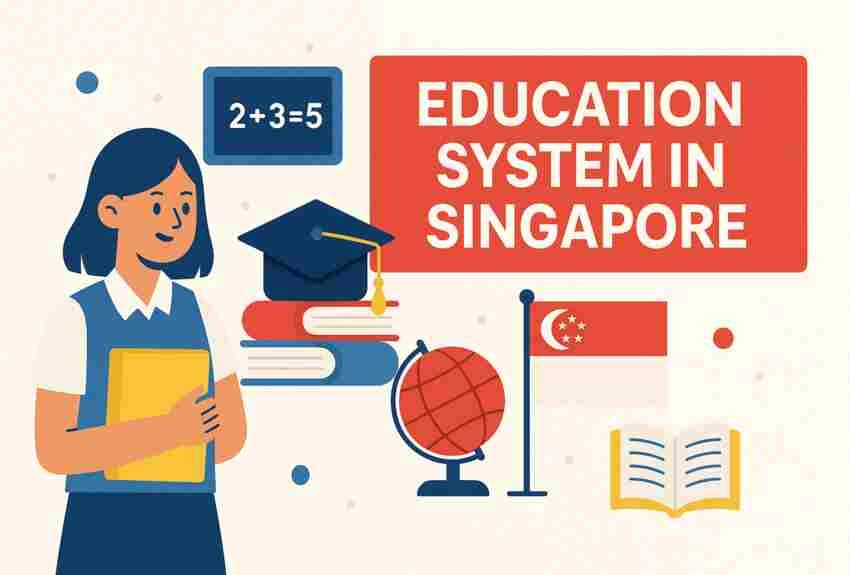
Singapore has established itself as a global education hub, attracting thousands of international students each year. The country’s education system is known for its academic excellence, strong government support, and emphasis on research and innovation. If you are planning to study in Singapore, understanding the education system will help you make informed decisions about your academic journey.
Highlights
| Feature | Details |
| Primary Language | English, Mandarin, Malay, Tamil |
| Education Levels | Primary, Secondary, Pre-University, Higher Education |
| Top Universities | NUS, NTU, SMU, SUTD, SIT |
| Popular Courses | Business, Engineering, IT, Medicine, Finance |
| Tuition Fees | SGD 10,000 – SGD 50,000 per year (varies by course) |
| Scholarships | Available for international students |
Structure of the Education System in Singapore
Singapore’s education system follows a structured pathway that ensures students gain skills and knowledge for their careers. The system is divided into five key stages:
1. Primary Education (Age: 6-12 years)
Primary education in Singapore is compulsory and lasts for six years. It consists of foundational learning in subjects like English, Mathematics, Science, and Mother Tongue languages. The Primary School Leaving Examination (PSLE) determines students’ placement into secondary schools.
2. Secondary Education (Age: 12-16 years)
Secondary education is divided into four different tracks based on academic ability:
- Express Stream: 4-year program leading to the GCE O-Level examination.
- Normal (Academic) Stream: 5-year program leading to the GCE N-Level and later O-Level.
- Normal (Technical) Stream: Focuses on technical education, preparing students for vocational training.
- Integrated Programme: A 6-year program that skips O-Levels and directly leads to A-Levels or IB.
3. Pre-University Education (Age: 16-18 years)
Students can choose between three main pathways:
- Junior Colleges (JC): A 2-year program leading to the GCE A-Level.
- Polytechnics: A 3-year diploma course specializing in industry-related fields.
- Institute of Technical Education (ITE): Provides vocational training and certifications.
4. Higher Education in Singapore
Singapore’s higher education system is highly ranked globally, with top universities and technical institutions offering a range of programs for international students.
Top Universities in Singapore
| University | QS World Ranking 2025 | Popular Courses |
| National University of Singapore (NUS) | #8 | Engineering, Business, Law |
| Nanyang Technological University (NTU) | #26 | Robotics, AI, Finance |
| Singapore Management University (SMU) | #98 | Business, Economics, Law |
| Singapore University of Technology and Design (SUTD) | #151-200 | Architecture, Design, Engineering |
| Singapore Institute of Technology (SIT) | Not Ranked | Applied Sciences, Hospitality |
5. Private Universities and Global Partnerships
Several private institutions collaborate with international universities to offer degree programs. Examples include:
- James Cook University Singapore
- SP Jain School of Global Management
- Kaplan Singapore
Admission Requirements for International Students
To study in Singapore, international students must meet specific academic and language requirements.
Basic Admission Criteria
- Undergraduate Programs: High school diploma equivalent to Singapore’s A-Levels or IB.
- Postgraduate Programs: Bachelor’s degree in a relevant field.
- English Proficiency: TOEFL (90-100), IELTS (6.5 or higher), or Duolingo (110+). Some universities may exempt students from English-speaking countries.
Tuition Fees and Cost of Living in Singapore
The cost of studying in Singapore varies depending on the university and course.
Tuition Fees for International Students
| Program Type | Estimated Annual Fees (SGD) |
| Diploma | 8,000 – 15,000 |
| Undergraduate | 10,000 – 50,000 |
| Postgraduate | 20,000 – 60,000 |
Living Expenses
| Expense | Monthly Cost (SGD) |
| Accommodation | 500 – 2,000 |
| Food | 300 – 600 |
| Transport | 100 – 200 |
| Miscellaneous | 200 – 400 |
| Total (Estimated) | 1,100 – 3,200 |
Scholarships for International Students
Singapore offers various scholarships to support international students. Some of the well-known scholarships include:
- Singapore International Graduate Award (SINGA) – For PhD students.
- ASEAN Scholarship – For students from ASEAN countries.
- NUS and NTU Merit Scholarships – Based on academic performance.
Student Visa and Work Opportunities
International students must apply for a Student Pass through the Immigration and Checkpoints Authority (ICA).
Visa Requirements:
- Offer letter from a recognized institution.
- Proof of financial support.
- Health insurance and medical checkup.
Part-time Work Opportunities
Students can work up to 16 hours per week during the semester and full-time during vacations.
Conclusion
Singapore is a top destination for international students due to its world-class education system, safe environment, and multicultural atmosphere. With globally recognized degrees and excellent career opportunities, Singapore provides a strong foundation for future success.
If you are planning to study in Singapore, ensure you research your university options, check financial aid opportunities, and prepare for an exciting academic journey ahead!
Are you ready to explore your study options in Singapore? Reach out to universities, check admission deadlines, and begin your application today!
